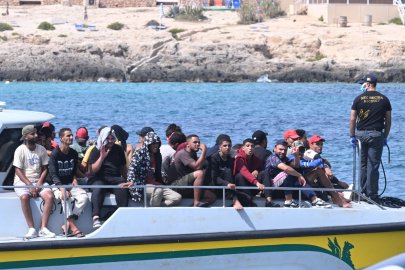Over 300 Migrants Arrive on Lampedusa in Just Hours
The Mediterranean Sea continues to be a focal point for migration, with a significant number of individuals risking their lives to seek refuge in Europe. Recent reports have highlighted a surge in the arrival of migrants on the small Italian island of Lampedusa. In just a few short hours, over 300 migrants landed on its shores, underscoring the ongoing humanitarian crisis in the region.
The Current Situation in Lampedusa
Lampedusa has become one of the primary entry points for migrants attempting to reach Europe. The island, located between Sicily and Tunisia, is often overwhelmed by the number of people arriving in search of safety and a better life. The recent influx of over 300 migrants in a matter of hours is a stark reminder of the ongoing struggles faced by those fleeing conflict, poverty, and persecution in their home countries.
Understanding the Challenges Faced by Migrants
Migrants arriving on Lampedusa often come from various backgrounds and regions, including Africa and the Middle East. The challenges they face are numerous and complex:
- Dangerous Journeys: Many migrants undertake perilous sea journeys in overcrowded and unseaworthy boats, risking their lives in search of safety.
- Unsanitary Conditions: Upon arrival, migrants often find themselves in overcrowded facilities with limited access to basic necessities like food, water, and medical care.
- Legal Uncertainty: Migrants frequently encounter complicated legal processes that can leave them in limbo, unsure of their status and future in Europe.
The Humanitarian Response
The arrival of a large number of migrants in such a short time frame calls for a robust humanitarian response. Local authorities, NGOs, and international organizations play a crucial role in providing assistance. Their efforts include:
- Emergency Shelter: Providing temporary housing for migrants to ensure they have a safe place to sleep and rest.
- Healthcare Services: Offering medical care to those in need, especially for vulnerable populations such as women and children.
- Psychosocial Support: Addressing the mental health needs of migrants who have experienced trauma during their journey.
The Role of European Policies
The situation in Lampedusa also raises questions about broader European migration policies. As migration continues to be a contentious issue, various countries within the European Union (EU) have differing approaches to handling arrivals.
Some key points to consider include:
- Asylum Procedures: The need for a streamlined and fair asylum process that respects the rights of migrants and ensures their safety.
- Solidarity Among Member States: The importance of shared responsibility among EU countries to assist frontline states like Italy in managing migrant inflows.
- Addressing Root Causes: Acknowledging the need for long-term solutions that address the underlying issues driving people to migrate in the first place.
The Impact of Public Perception
The arrival of migrants on Lampedusa often evokes strong public reactions, both supportive and oppositional. Understanding public perception is crucial for shaping effective policies and responses. Some factors influencing opinions include:
- Media Representation: How media outlets portray migrants can shape public attitudes, either fostering empathy or fueling xenophobia.
- Personal Experiences: Individuals who have direct contact with migrants may have different perspectives compared to those who rely on media narratives.
- Political Rhetoric: Political leaders and their statements can significantly influence public sentiment, either encouraging compassion or inciting fear.
Future Outlook
The situation on Lampedusa is not a standalone issue but rather part of a broader migration crisis affecting many regions around the world. As more migrants seek refuge, it is essential for governments, NGOs, and communities to work together to find sustainable solutions. The focus should be on:
- Human Rights: Ensuring that the rights and dignity of migrants are upheld throughout the migration process.
- Collaboration: Encouraging cooperation between countries to create a unified approach to migration that balances humanitarian needs with security concerns.
- Awareness Raising: Educating the public about the complexities of migration to foster understanding and reduce stigma.
Conclusion
The recent arrival of over 300 migrants on Lampedusa in just a few hours highlights the urgent need for a comprehensive and humane approach to migration. By addressing the challenges faced by migrants, fostering collaboration among European nations, and promoting public awareness, we can work towards a future where the rights and needs of all individuals, regardless of their background, are respected and protected. The journey towards a fair and just migration system requires commitment, understanding, and action from all sectors of society.










